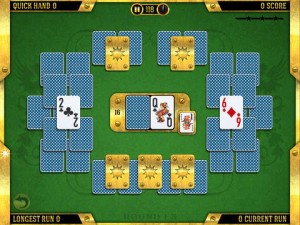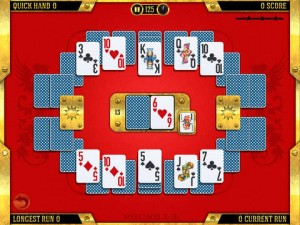Have you ever before played any variant of Pyramid Solitaire? Xi-Art’s Towers Battle Solitaire (out now, free) — although sharing some similar concepts — isn’t exactly the same game. The similarity is that you can only successfully move a card when all of the cards above it have first been removed, the difference being that you’re not attempting to remove card pairs adding up to 13. Another difference is that while Pyramid Solitaire might be free to play however much you’d like, this game — despite claiming to be free upfront — is actually one of the most aggressively not-free mobile apps you’ll ever find.
 Anyways — getting back to focus — in Towers Battle Solitaire you’ll have various pyramid-esque constructs, as well as a deck in the playing field’s center that contains all of the cards not located in any of the aforementioned pyramids. When the game begins — assuming you’re even allowed to start playing at all — an eighty second countdown timer will begin ticking down, alongside the first card in the center deck being turned face up. At this point you can move any unblocked card from the pyramids over to the just created discard pile — i.e. the face up card — so long as its value is plus/minus one in relation to the face up card, after which the just moved card will be the discard pile’s new topmost item.
Anyways — getting back to focus — in Towers Battle Solitaire you’ll have various pyramid-esque constructs, as well as a deck in the playing field’s center that contains all of the cards not located in any of the aforementioned pyramids. When the game begins — assuming you’re even allowed to start playing at all — an eighty second countdown timer will begin ticking down, alongside the first card in the center deck being turned face up. At this point you can move any unblocked card from the pyramids over to the just created discard pile — i.e. the face up card — so long as its value is plus/minus one in relation to the face up card, after which the just moved card will be the discard pile’s new topmost item.
You will repeat this process until there are either no more cards you can successfully pull from the pyramids, or until you’re at least personally convinced there are no more cards you can successfully pull from the pyramids. At this point you can pull the next card from the center deck and place it on top of the discard pile, after which you may continue forward once more with removing as many cards from the pyramids as humanly possible. Your goal during all of this is to ideally destroy all of the pyramids within the allotted time frame, with a final score being award based on: number of cards removed — longest card removal combo-streak — as well as if any removal combos involved golden cards.
Should you win you’ll be given a new set of pyramids to destroy — alongside bonus points for however much time was left remaining on the clock — and allowed the opportunity to keep playing, but if you lose you’ll instead run headfirst in the game’s wretched greed. The first dilemma of which is that you have a heart energy bar that permits you to play no more than five games in a row before you’re forced to pay to restock your energy reserve, but this energy bar might as well not even exist. That’s because — beyond spending a heart for each game you play — you’ll additionally have to spend gold or silver on each game as well, and that’s assuming there’s even a current game available you’re allowed to join.
 The three game-types are: Free Tournament (a grand misnomer), Fast Tournament (that you can only play once until a hundred different people chime-in, causing a new tournament to start), and Battle Tournament (which you often can’t even enter at all). Now whereas the Battle Tournament and Fast Tournament each cost a single gold coin to enter (and you initially only begin with 10 of those), you’ll need a hefty 500 silver coins to enter one of these so-called Free Tournaments (and you start with only 1000 silver). Now further remember that you’ll never earn free gold unless you’re amongst the top placing members in the tournament you entered, and the silver-based consolation prize — when you inevitably lose — will be a far cry from the 500 needed for the falsely free game.
The three game-types are: Free Tournament (a grand misnomer), Fast Tournament (that you can only play once until a hundred different people chime-in, causing a new tournament to start), and Battle Tournament (which you often can’t even enter at all). Now whereas the Battle Tournament and Fast Tournament each cost a single gold coin to enter (and you initially only begin with 10 of those), you’ll need a hefty 500 silver coins to enter one of these so-called Free Tournaments (and you start with only 1000 silver). Now further remember that you’ll never earn free gold unless you’re amongst the top placing members in the tournament you entered, and the silver-based consolation prize — when you inevitably lose — will be a far cry from the 500 needed for the falsely free game.
Outside of the game maybe feeling sorry for you once every few hours — after which it’ll toss a few gold coins your way, or just enough silver for a single “Free Tournament” — don’t you worry about ever legitimately earning anything, because you simply won’t. That’s because paying players can — utilizing their gold — opt to add time to their count-down clock, pay to be allowed to cycle through their deck a second time, and even pay to add Jokers to their deck. Between the cool-down hearts — the coin entry fees — and the game types that will often be not available to you for various reasons, you’ll be lucky to get in more than a single piddling eighty-second session whenever you load this app up.
Additionally — despite the developer’s claims to the contrary — you won’t eventually make things easier for yourself, no matter how long you attempt level-up your account’s status. Although it’s true that performing fairly well will earn your experience points — and these will even cause your account’s level to eventually go up — it’s not even vaguely true that the results will help you at all, unless you plan to cheat. All that increasing your account’s level will do is make the value of IAP cheating items more potent, only furthering the fact that Towers Battle Solitaire is exclusively geared in favor of those paying to win.
 Lastly — but perhaps not least — you can only play this wretched game when your mobile device is capable of going online, and then you’ll additionally be bombarded regularly with full-on video ads. There’s simply no reason for you to ever download this ill-advised joke, especially when there’s far better — and infinitely less greedy — free solitaire programs available on the iTunes App Store. I honestly never thought I’d find a game that would actually spend less time beating around the bush — when it came to absolute greed — than Rule the Kingdom (our review), but I guess I was finally proven wrong.
Lastly — but perhaps not least — you can only play this wretched game when your mobile device is capable of going online, and then you’ll additionally be bombarded regularly with full-on video ads. There’s simply no reason for you to ever download this ill-advised joke, especially when there’s far better — and infinitely less greedy — free solitaire programs available on the iTunes App Store. I honestly never thought I’d find a game that would actually spend less time beating around the bush — when it came to absolute greed — than Rule the Kingdom (our review), but I guess I was finally proven wrong.
Verdict
Unless you like shelling out infinite money to win tournaments designed to exclusively favor those whom wasted the most money on winning, don’t ever bother downloading this ludicrously-greedy — and impossible to play — joke.


